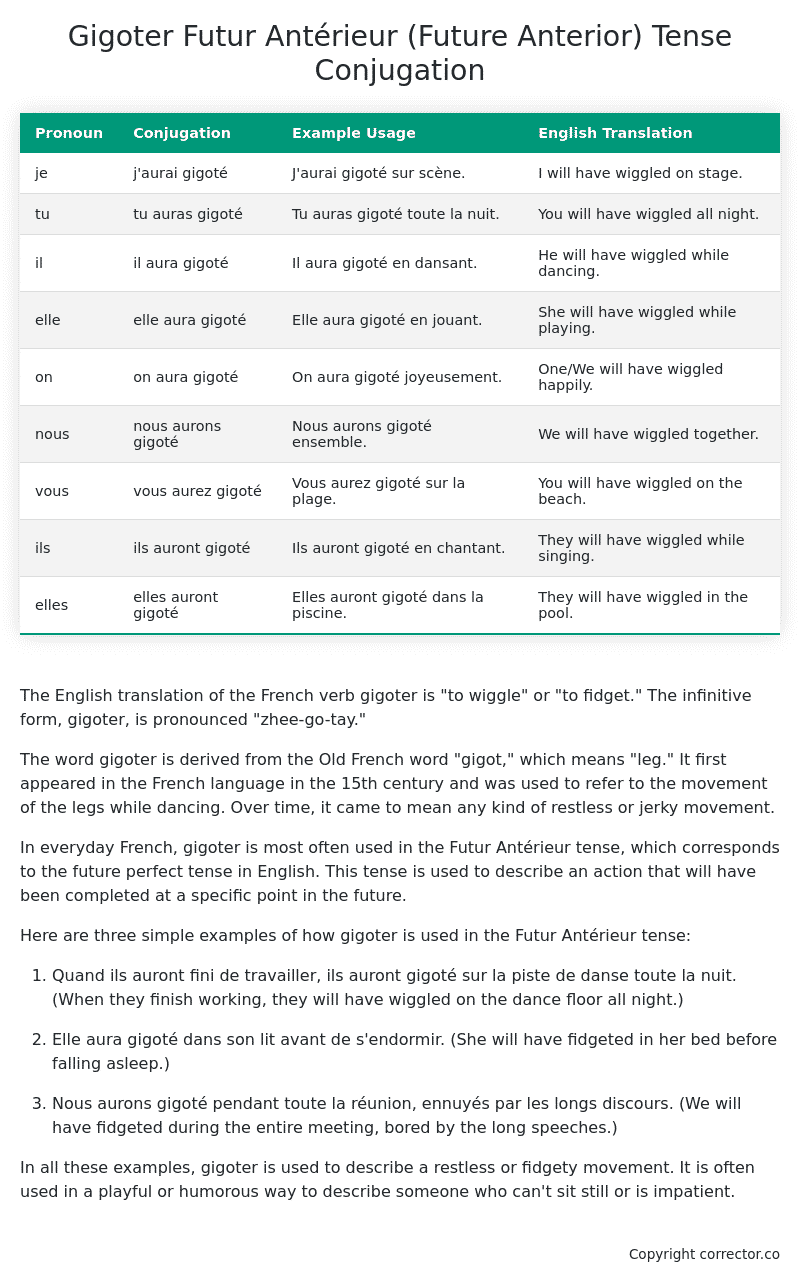Futur Antérieur (Future Anterior) Tense Conjugation of the French Verb gigoter
Introduction to the verb gigoter
The English translation of the French verb gigoter is “to wiggle” or “to fidget.” The infinitive form, gigoter, is pronounced “zhee-go-tay.”
The word gigoter is derived from the Old French word “gigot,” which means “leg.” It first appeared in the French language in the 15th century and was used to refer to the movement of the legs while dancing. Over time, it came to mean any kind of restless or jerky movement.
In everyday French, gigoter is most often used in the Futur Antérieur tense, which corresponds to the future perfect tense in English. This tense is used to describe an action that will have been completed at a specific point in the future.
Here are three simple examples of how gigoter is used in the Futur Antérieur tense:
-
Quand ils auront fini de travailler, ils auront gigoté sur la piste de danse toute la nuit. (When they finish working, they will have wiggled on the dance floor all night.)
-
Elle aura gigoté dans son lit avant de s’endormir. (She will have fidgeted in her bed before falling asleep.)
-
Nous aurons gigoté pendant toute la réunion, ennuyés par les longs discours. (We will have fidgeted during the entire meeting, bored by the long speeches.)
In all these examples, gigoter is used to describe a restless or fidgety movement. It is often used in a playful or humorous way to describe someone who can’t sit still or is impatient.
Table of the Futur Antérieur (Future Anterior) Tense Conjugation of gigoter
| Pronoun | Conjugation | Example Usage | English Translation |
|---|---|---|---|
| je | j’aurai gigoté | J’aurai gigoté sur scène. | I will have wiggled on stage. |
| tu | tu auras gigoté | Tu auras gigoté toute la nuit. | You will have wiggled all night. |
| il | il aura gigoté | Il aura gigoté en dansant. | He will have wiggled while dancing. |
| elle | elle aura gigoté | Elle aura gigoté en jouant. | She will have wiggled while playing. |
| on | on aura gigoté | On aura gigoté joyeusement. | One/We will have wiggled happily. |
| nous | nous aurons gigoté | Nous aurons gigoté ensemble. | We will have wiggled together. |
| vous | vous aurez gigoté | Vous aurez gigoté sur la plage. | You will have wiggled on the beach. |
| ils | ils auront gigoté | Ils auront gigoté en chantant. | They will have wiggled while singing. |
| elles | elles auront gigoté | Elles auront gigoté dans la piscine. | They will have wiggled in the pool. |
Other Conjugations for Gigoter.
Le Present (Present Tense) Conjugation of the French Verb gigoter
Imparfait (Imperfect) Tense Conjugation of the French Verb gigoter
Passé Simple (Simple Past) Tense Conjugation of the French Verb gigoter
Passé Composé (Present Perfect) Tense Conjugation of the French Verb gigoter
Futur Simple (Simple Future) Tense Conjugation of the French Verb gigoter
Futur Proche (Near Future) Tense Conjugation of the French Verb gigoter
Plus-que-parfait (Pluperfect) Tense Conjugation of the French Verb gigoter
Passé Antérieur (Past Anterior) Tense Conjugation of the French Verb gigoter
Futur Antérieur (Future Anterior) Tense Conjugation of the French Verb gigoter (this article)
Subjonctif Présent (Subjunctive Present) Tense Conjugation of the French Verb gigoter
Subjonctif Passé (Subjunctive Past) Tense Conjugation of the French Verb gigoter
Subjonctif Imparfait (Subjunctive Imperfect) Tense Conjugation of the French Verb gigoter
Subjonctif Plus-que-parfait (Subjunctive Pluperfect) Tense Conjugation of the French Verb gigoter
Conditionnel Présent (Conditional Present) Tense Conjugation of the French Verb gigoter
Conditionnel Passé (Conditional Past) Tense Conjugation of the French Verb gigoter
L’impératif Présent (Imperative Present) Tense Conjugation of the French Verb gigoter
L’infinitif Présent (Infinitive Present) Tense Conjugation of the French Verb gigoter
Struggling with French verbs or the language in general? Why not use our free French Grammar Checker – no registration required!
Get a FREE Download Study Sheet of this Conjugation 🔥
Simply right click the image below, click “save image” and get your free reference for the gigoter Futur Antérieur tense conjugation!

Gigoter – About the French Futur Antérieur (Future Anterior) Tense
Construction
Common Everyday Usage Patterns
Interactions with Other Tenses
For example
Summary
I hope you enjoyed this article on the verb gigoter. Still in a learning mood? Check out another TOTALLY random French verb conjugation!


